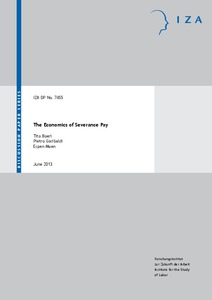The economics of severance pay

Boeri, Tito ; Garibaldi, Pietro ; Moen, Espen R.
Institute of Labor Economics, Bonn
IZA - Bonn
2013
24 p.
dismissal ; labour law ; severance pay
Discussion Paper
7455
Personnel management
English
Bibliogr.
"All OECD countries have either legally mandated severance pay or compensations imposed by industry-level bargaining in case of employer initiated job separations. According to the extensive literature on Employment Protection Legislation such transfers are either ineffective or highly distortionary. In this paper we show that mandatory severance is optimal in presence of wage deferrals when there is moral hazard of employers and workers, notably when employers cannot commit not to fire a non-shirker and shirkers can also get away with it. Our model also accounts for two neglected features of EPL. The first is that dismissal costs depend not only on whether the dismissal is deemed fair or unfair, but also on the nature, economic vs. disciplinary, of the layoff. The second feature is that compensation for unfair dismissal or severance is generally increasing with tenure."
Digital
The ETUI is co-funded by the European Union. Views and opinions expressed are however those of the author(s) only and do not necessarily reflect those of the European Union or the ETUI.